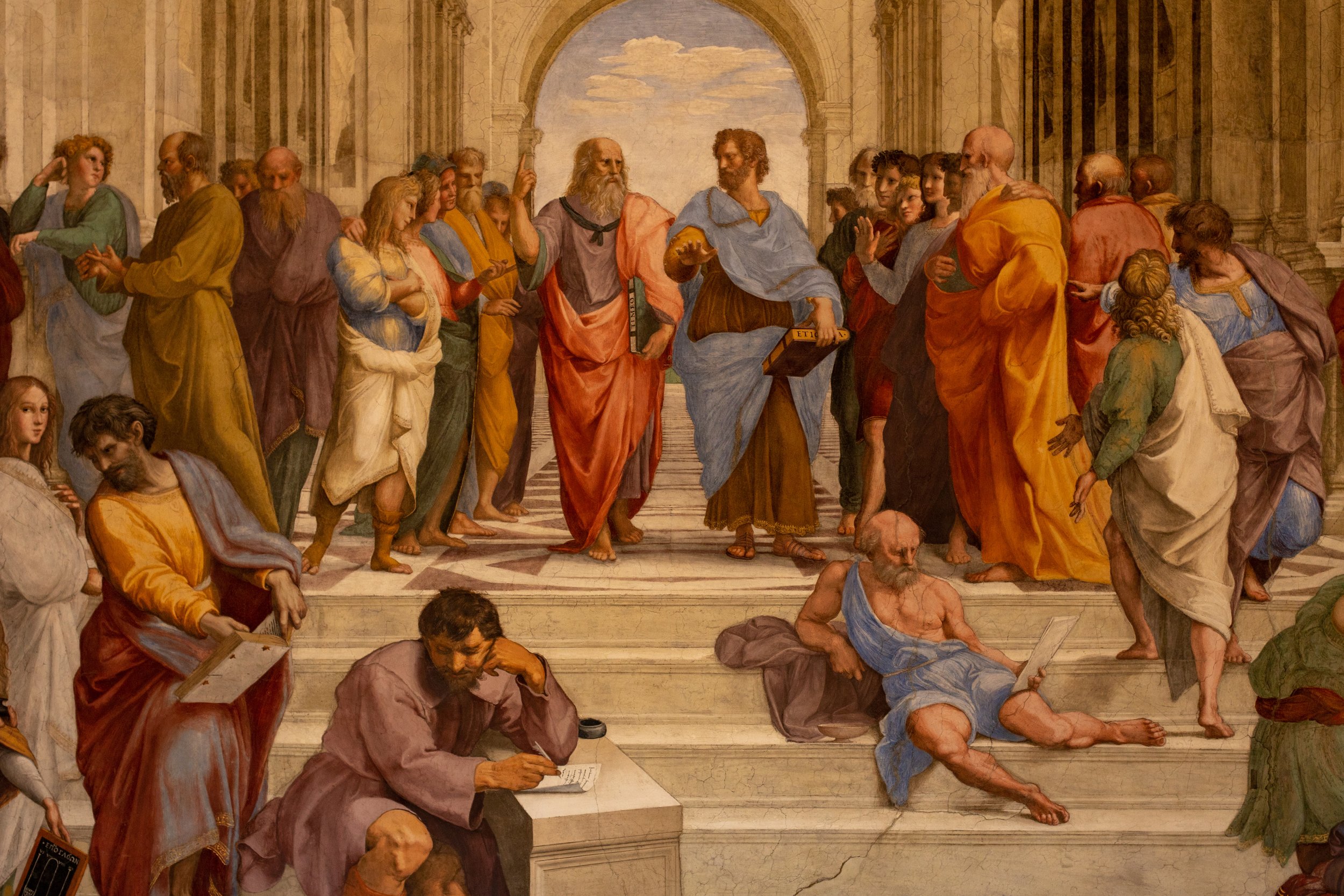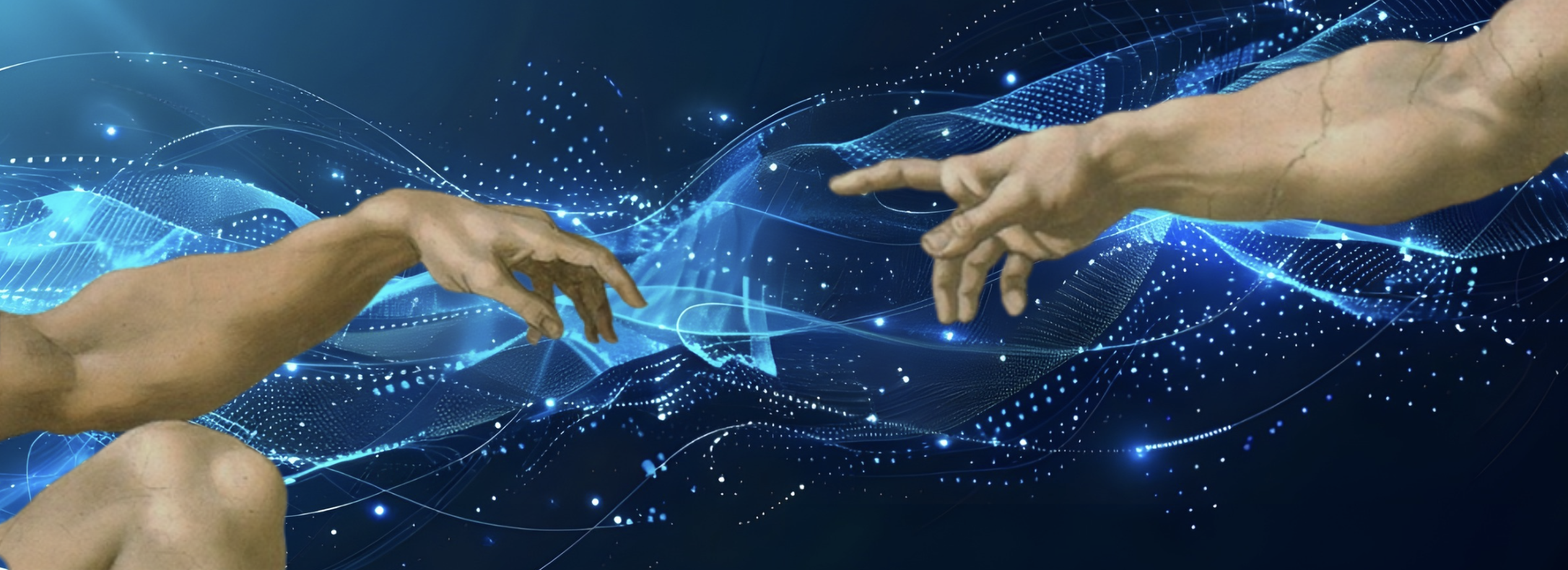
AI & Theology Symposium
Exploring the Future of Faith & Artificial Intelligence
September 29, 2025
Cambridge, Massachusetts
About This Event:
How does artificial intelligence intersect with faith, ethics, and human spirituality?
The AI & Theology Symposium brings together leading scholars, theologians, ethicists, and AI researchers to explore the profound implications of artificial intelligence for religious thought, spiritual practice, and human flourishing. As AI reshapes society, faith communities must grapple with its ethical, theological, and philosophical dimensions.
This interdisciplinary gathering will examine key questions at the frontier of AI and theology, such as:
• AI & The Soul – What are the implications for our understanding of the soul?
• Faith-Based AI Ethics – What moral responsibilities do AI developers and consumers have from a religious and ethical standpoint?
• AI & Religious Thought – How might AI transform scriptural interpretation, theological reasoning, and interfaith dialogue?
• Spiritual Companionship & AI – Can AI play a role in religious rituals, pastoral care, or spiritual well-being?
• Human Dignity & AI – What does it mean to be human in an age of intelligent machines, and how do religious traditions frame human uniqueness?
• Algorithmic Bias & Religious Freedom – How can we ensure AI systems respect and fairly represent diverse faith perspectives?
• Eschatology & AI – How does AI fit into religious narratives of the future, from apocalyptic warnings to utopian possibilities?
• AI in Worship & Liturgy – What role might AI play in digital spirituality, faith-based community-building, and religious leadership?
Through keynote lectures, panel discussions, and interactive workshops, this symposium will foster meaningful dialogue between technology and faith traditions. Whether you are a theologian, a technologist, a religious leader, or simply curious about AI’s spiritual dimensions, this event offers an opportunity to reflect deeply on the intersection of faith, technology, and the future of humanity.
Abstract Submission Guidelines – AI & Theology Symposium
Abstracts should be 300–500 words, clearly outlining the central theme, argument, and significance of the work in relation to AI and theology. Submissions should articulate how the topic contributes to theological, ethical, philosophical, or historical discussions on AI, as well as its implications for faith, spirituality, and human identity. Submit as a PDF or Word document to michael@neurospirituality.io.
Deadline: July 1, 2025. Selected abstracts will be notified by July 31, 2025 and invited for oral presentations.

Welcome to the AI Theology Coalition
Where Faith Meets Artificial Intelligence
As artificial intelligence reshapes the world, the AI Theology Coalition explores the profound intersection of AI, faith, ethics, and human spirituality. A project of the Neurospirituality Lab at the Center for Brain Circuit Therapeutics, the AI Theology Coalition is dedicated to fostering research, ethical guidance, and dialogue that ensure AI is human-centric and serves as an able partner to humanity—one that amplifies wisdom, moral responsibility, and human dignity.
Our Research & Focus Areas
The AI Theology Coalition explores a broad range of AI & faith, values, and ethics-related topics, including:
AI & The Soul: Consciousness, Personhood, and Moral Agency
Can AI ever possess consciousness or moral agency, and how does this challenge theological perspectives on the soul?
This area explores the nature of intelligence, free will, and spiritual personhood in relation to AI, drawing from religious, philosophical, and neuroscientific perspectives.Faith-Based AI Ethics: Moral Responsibilities in AI Development
What ethical responsibilities do AI developers have, and how should religious traditions shape AI governance?
This focus area examines the role of faith-informed moral reasoning in shaping AI policies, addressing algorithmic bias, justice, accountability, and the role of theological ethics in AI decision-making.AI & Religious Thought: Scriptural Interpretation, Theology, and Epistemology
How might AI transform theological reasoning, scriptural interpretation, and interfaith dialogue?
This area explores AI’s role in analyzing religious texts, preserving theological traditions, and engaging in philosophical debates on truth, knowledge, and divine inspiration.Spiritual Companionship & AI: Pastoral Care, Religious Leadership, and AI as Guide
Can AI play a role in religious rituals, pastoral care, or spiritual well-being?
This area examines how AI might assist in counseling, prayer, faith formation, and religious leadership while maintaining human agency and the sacredness of personal spiritual journeys.Human Dignity & AI: Theological Anthropology and the Future of Humanity
What does it mean to be human in an age of intelligent machines, and how do religious traditions frame human uniqueness? This focus area explores theological anthropology, the concept of the image of God (Imago Dei), transhumanism, and how AI challenges or affirms human dignity, embodiment, and relationality.Algorithmic Bias & Religious Freedom: AI, Inclusion, and Ethical Safeguards
How can we ensure AI systems respect and fairly represent diverse faith perspectives?
This area focuses on the risks of algorithmic discrimination, the representation of religious identities in AI-generated content, and the need for safeguards to protect religious freedom in digital spaces.AI & the Future of Worship, Liturgy, and Community
What role might AI play in digital spirituality, faith-based community-building, and religious leadership?
This focus area considers AI-generated sermons, sacred music, digital liturgies, and virtual religious spaces, questioning how technology enhances or disrupts communal worship and spiritual formation.AI & Eschatology: Religious Visions of the Future
How does AI fit into religious narratives of the future, from apocalyptic warnings to utopian possibilities?
This area examines eschatological themes in relation to AI, exploring theological interpretations of technological progress, existential risk, and divine sovereignty in shaping human destiny.Neurospirituality, AI, and Human Flourishing
What does neuroscience tell us about AI, spirituality, and human intelligence?
This focus area explores the intersection of neurospirituality and AI, considering how AI might influence or enhance meditation, religious experiences, mental health, and well-being in faith communities.AI & Theology in Public Life: Policy, Education, and Ethical Discourse
How should AI be integrated into faith-based educational institutions, public discourse, and policymaking?
This area addresses the role of theology in shaping AI literacy, theological education on AI, and the responsibilities of religious institutions in ethical debates on emerging technology.AI & Christian Mysticism: Prayer, Contemplation, and the Limits of Knowledge
How does AI interact with Christian mystical traditions, contemplative prayer, and divine illumination?
This focus area explores whether AI can assist in practices like centering prayer or hesychasm, how it influences mystical experiences and spiritual visions, and whether AI-generated knowledge challenges or aligns with apophatic theology (the way of unknowing). It also examines AI’s role in digital silence, prophetic imagination, and the interplay between divine presence and technological mediation.
Get Involved
The AI Theology Coalition invites scholars, technologists, religious leaders, and the public to join us in shaping the future of AI & faith.
You can:
➡️ Attend the AI & Theology Symposium Register Now
➡️ Collaborate with us – Scholars and institutions interested in research partnerships can contact us.
➡️ Support our Work – Learn how to fund AI & Theology research and propose research areas michael@neurospirituality.io
About Us
AI Theology Coalition is an initiative within the Neurospirituality Lab dedicated to exploring the intersection of artificial intelligence, theology, ethics, and human spirituality. The program is led by Dr. Michael Ferguson, PhD, Instructor in Neurology at Harvard Medical School and director of the Neurospirituality Lab at the Center for Brain Circuit Therapeutics, and Rev. Dr. Marian Edmonds-Allen, Media Director and Teaching and Research Associate at the Neurospirituality Lab.
AI Theology Coalition is accepting applications for distinguished Fellows, contact marian@neurospirituality.io
These scholars and thought leaders contribute to groundbreaking research, ethical discourse, and interdisciplinary collaboration at the forefront of AI and faith.
“Men go abroad to wonder at the heights of mountains, at the huge waves of the sea, at the long courses of the rivers, at the vast compass of the ocean, at the circular motions of the stars, and they pass by themselves without wondering.”
– St. Augustine
"I am the intelligence of the intelligent, and the brilliance of the brilliant."
– Bhagavad Gita 7:10
